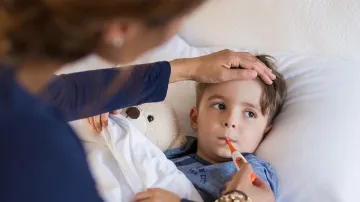The Indian Academy of Pediatrics (IAP) has issued an advisory for parents and caregivers: do not give antibiotics to children suffering from viral fever. Viral infections, which are caused by viruses and not bacteria, do not respond to antibiotics. Overuse of antibiotics can lead to resistance, making bacterial infections harder to treat in the future.
Understanding Viral Fever
Viral fever is a common illness in children characterised by a sudden rise in body temperature, body aches, fatigue, and sometimes respiratory symptoms like a runny nose and cough. Unlike bacterial infections, viral fevers are usually self-limiting and resolve on their own with proper care and rest.
Why Avoid Antibiotics?
Ineffectiveness: Antibiotics target bacteria, not viruses. Using them for viral infections provides no benefit and does not speed up recovery.
Antibiotic Resistance: Misuse of antibiotics can lead to the development of resistant bacteria, posing a significant health risk.
Side Effects: Antibiotics can cause adverse effects such as stomach upset, diarrhoea, and allergic reactions.
5 Home Remedies for Treating Viral Fever
While viral fever must run its course, several home remedies can help alleviate symptoms and ensure comfort for your child:
- Hydration: Ensure your child drinks plenty of fluids. Water, coconut water, and oral rehydration solutions (ORS) are excellent choices. Staying hydrated helps in reducing fever and prevents dehydration, which is a common concern with fever.
- Rest: Adequate rest is crucial for recovery. Encourage your child to sleep and relax as much as possible. Rest helps the immune system fight off the virus more effectively.
- Lukewarm Sponge Bath: Giving your child a sponge bath with lukewarm water can help bring down fever. Avoid cold baths as they can cause shivering, which may increase the body temperature further.
- Comfortable Environment: Keep your child in a cool, comfortable environment. Dress them in lightweight clothing and use a fan to maintain a comfortable room temperature. Avoid heavy blankets as they can trap heat.
- Nutrient-Rich Diet: Offer a balanced diet rich in fruits, vegetables, and whole grains. Foods high in vitamins and minerals can support the immune system. Light, easy-to-digest meals such as soups and broths can be particularly soothing.
When to Seek Medical Attention
While home remedies can provide relief, it's important to monitor your child's symptoms closely. Seek medical attention if your child experiences:
- Persistent high fever (above 102°F or 38.9°C) for more than three days.
- Severe headache, neck stiffness, or sensitivity to light.
- Difficulty breathing or chest pain.
- Persistent vomiting or diarrhoea, leading to dehydration.
- Signs of a secondary bacterial infection, such as a sore throat, earache, or a persistent cough.
By following the IAP’s guidelines and utilising these home remedies, you can help your child recover comfortably from viral fever without the unnecessary use of antibiotics. Always consult with a healthcare professional if you have any concerns about your child's health.
ALSO READ: WHO prequalifies second dengue vaccine | Check details
